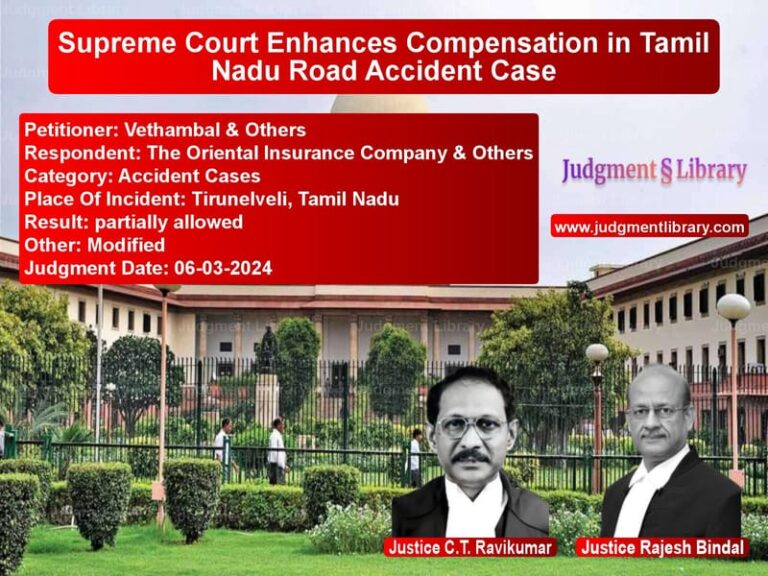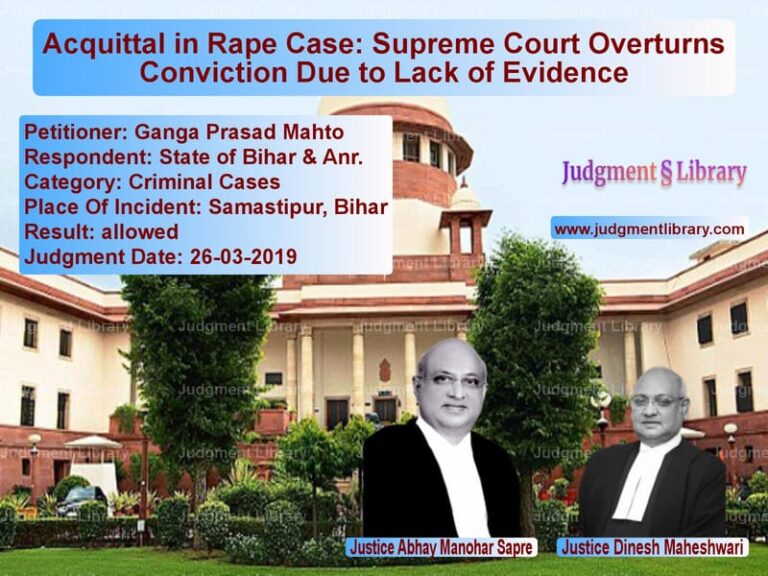Supreme Court Ruling on the Conviction of Appellants in a Suicide Case: Key Legal Insights
The Supreme Court of India, in its recent judgment, dealt with the appeal of two appellants, Mariano Anto Bruno and his mother, challenging their conviction under Sections 498A (cruelty) and 306 (abetment of suicide) of the Indian Penal Code (IPC). The appellants had been convicted by the Sessions Court and the judgment was upheld by the High Court of Madras, which led to the present appeal. The case involved the tragic suicide of Dr. M. Amali Victoria, a psychiatrist, who had been married to the first appellant, Dr. Mariano Anto Bruno, in 2005. Her death, on November 5, 2014, came after a history of marital difficulties, including claims of mental cruelty and harassment, particularly due to the pressure of conceiving another child. The Supreme Court, after hearing the arguments, found merit in the appellants’ case and ultimately acquitted them of the charges, setting aside the decisions of both the Trial Court and the High Court.
Background of the Case
The case originates from the death of Dr. Amali Victoria, a medical professional, who was found unconscious in the bathroom of her home and was declared dead upon arrival at the hospital. The initial police inquiry recorded the death as unnatural, and the FIR was registered under Section 174 of the Cr.P.C. based on the statements from Appellant No. 1, Mariano Anto Bruno. Three weeks after the death, the mother of the deceased filed a complaint accusing the appellants of subjecting the deceased to mental and physical cruelty and causing her suicide. This led to charges under Sections 498A and 306 IPC being framed against the appellants.
The prosecution’s case was that the deceased had been subjected to constant mental harassment by the appellants, particularly in relation to dowry demands and pressures to have another child after a miscarriage. It was claimed that this led the deceased to take the extreme step of ending her life. The trial court convicted the appellants, sentencing them to three years of imprisonment for cruelty and seven years for abetment of suicide. The appellants appealed to the High Court, which upheld the conviction. The appellants then appealed to the Supreme Court, leading to the present judgment.
Arguments Presented by the Appellants
The appellants, through their senior counsel, raised several key points:
- The allegations of cruelty were made only after the death of the deceased, and there was no previous complaint or evidence to support the claims of cruelty or harassment during their nine years of marriage.
- Appellant No. 1 was unaware of the deceased’s bipolar disorder, which had been a significant factor in her mental health issues. This fact was not disclosed to him during the marriage, and he had taken steps to manage her condition, including taking her for psychiatric treatment.
- The complaint was filed with ulterior motives, particularly after the appellant’s refusal to grant custody of their son to the deceased’s sister. This conflict was cited as the basis for the fabricated claims of cruelty.
- The prosecution’s reliance on statements from the deceased’s family (PW-1 to PW-3) was flawed, as they were interested witnesses with a possible bias in the matter.
- The medical history of the deceased, including her past suicide attempts and ongoing mental health treatment, was not adequately considered in the trial proceedings.
Arguments Presented by the Respondents
The respondents, represented by the deceased’s family, argued as follows:
- The deceased had been subjected to constant mental cruelty and harassment by the appellants, including dowry demands, emotional abuse, and coercion related to childbearing.
- The testimonies of PW-1, PW-2, and PW-3 (the deceased’s family members) established a clear pattern of harassment, which culminated in the deceased taking her own life.
- Despite the medical treatment for the deceased’s mental health issues, the harassment by the appellants exacerbated her condition, leading to her suicide.
- The courts below had rightly convicted the appellants based on the overwhelming evidence, including the testimony of the medical professionals who treated the deceased and the post-mortem findings.
Supreme Court’s Observations
The Supreme Court carefully examined the facts and legal provisions relevant to the case, particularly Sections 306 and 498A of the IPC. The Court noted the following:
- Section 306 IPC (abetment of suicide) requires proof of abetment by the accused, which involves instigating or encouraging the deceased to take their own life. Mere allegations of harassment are not sufficient without clear evidence of an active role in causing the victim to commit suicide.
- The Court referred to previous rulings on the definition of “instigation,” including the case of Geo Varghese v. State of Rajasthan, which clarified that instigation involves provoking or encouraging someone to commit suicide.
- The Court also examined the provisions of Section 498A IPC (cruelty by husband or his relatives), which requires proof of cruelty in connection with dowry demands or harassment related to the victim’s marital life.
- The Court emphasized the importance of considering the medical history of the deceased, which included a long-standing history of mental health issues, including bipolar disorder and suicidal tendencies.
- The Court acknowledged that the appellant’s actions, including seeking medical help for the deceased and attempting to manage her condition, did not meet the threshold for abetment of suicide as required under Section 306 IPC.
Final Verdict
The Supreme Court, after careful consideration of the facts, legal principles, and the evidence presented, concluded that:
- The conviction of the appellants under Sections 306 and 498A IPC was not sustainable, as there was insufficient evidence of cruelty or abetment of suicide in the case.
- The testimony of the deceased’s family members was not reliable, given the absence of prior complaints and the potential ulterior motives involved in the allegations.
- The appellants were acquitted of all charges, and the appeal was allowed. The decisions of the High Court and Trial Court were set aside.
Implications of the Judgment
This judgment has several key implications for cases involving allegations of cruelty and abetment of suicide:
- The Court reiterated the importance of establishing clear evidence of cruelty or harassment in cases under Section 498A IPC, particularly when the allegations are made posthumously.
- The ruling clarified that mere allegations of mental or emotional abuse are not enough to convict someone under Section 306 IPC. There must be direct evidence of instigation or encouragement leading to the suicide.
- The Court also emphasized the need to consider the victim’s mental health history and the context of their actions before assigning blame for their suicide, particularly when there is a documented history of mental illness.
- Finally, the judgment underlined the necessity for careful judicial scrutiny in cases involving sensitive issues like suicide, where the legal consequences of conviction can have far-reaching impacts.
The judgment serves as a reminder of the importance of ensuring that justice is served based on clear, cogent evidence, and not on mere allegations, especially in cases where lives are lost under tragic circumstances.
Petitioner Name: Mariano Anto Bruno & Anr..Respondent Name: The Inspector of Police.Judgment By: Justice Krishna Murari, Justice M.R. Shah.Place Of Incident: Chennai.Judgment Date: 12-10-2022.
Don’t miss out on the full details! Download the complete judgment in PDF format below and gain valuable insights instantly!
Download Judgment: mariano-anto-bruno-&-vs-the-inspector-of-pol-supreme-court-of-india-judgment-dated-12-10-2022.pdf
Directly Download Judgment: Directly download this Judgment
See all petitions in Murder Cases
See all petitions in Fraud and Forgery
See all petitions in Custodial Deaths and Police Misconduct
See all petitions in Judgment by Krishna Murari
See all petitions in Judgment by Mukeshkumar Rasikbhai Shah
See all petitions in allowed
See all petitions in Modified
See all petitions in supreme court of India judgments October 2022
See all petitions in 2022 judgments
See all posts in Criminal Cases Category
See all allowed petitions in Criminal Cases Category
See all Dismissed petitions in Criminal Cases Category
See all partially allowed petitions in Criminal Cases Category







